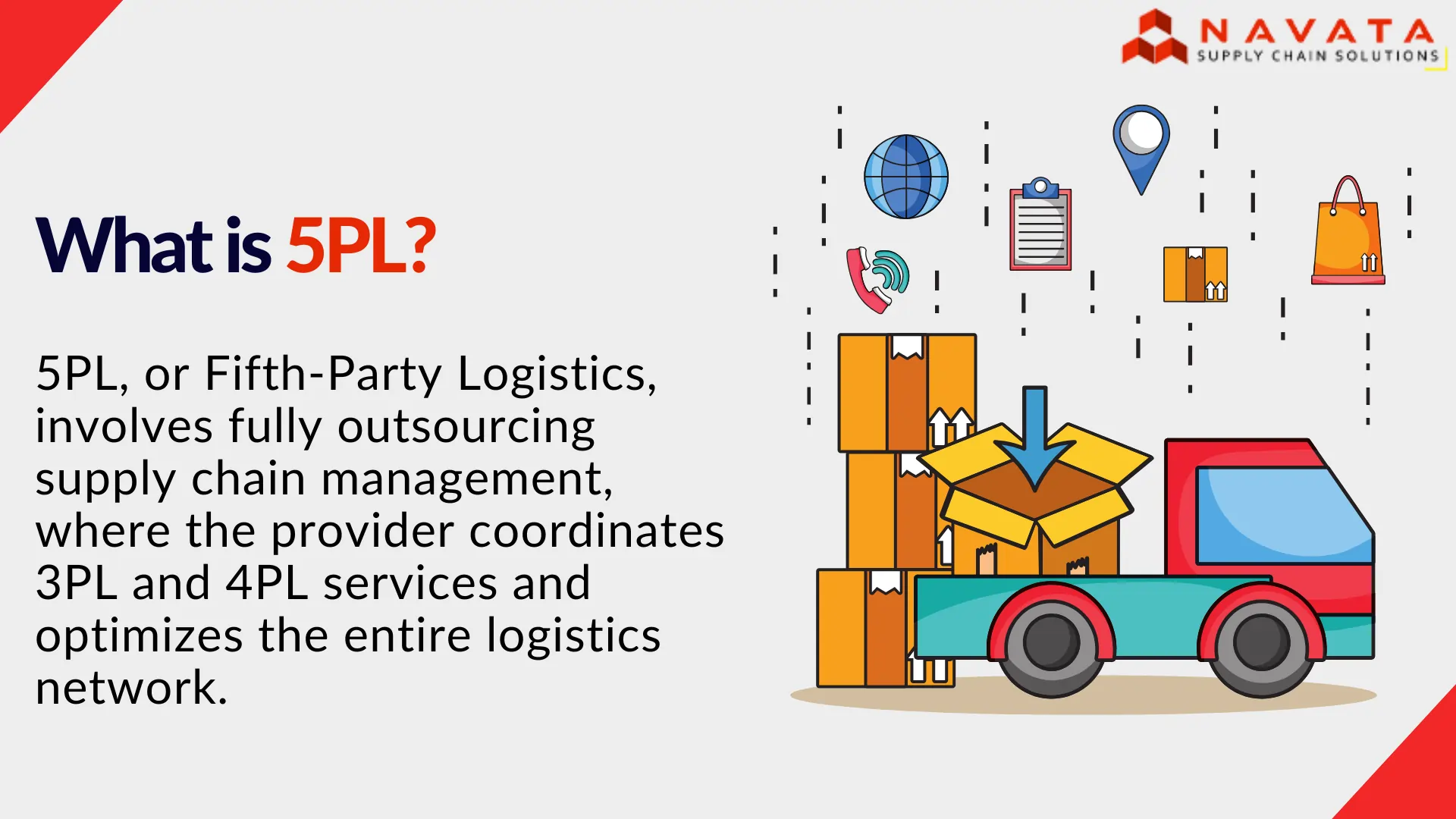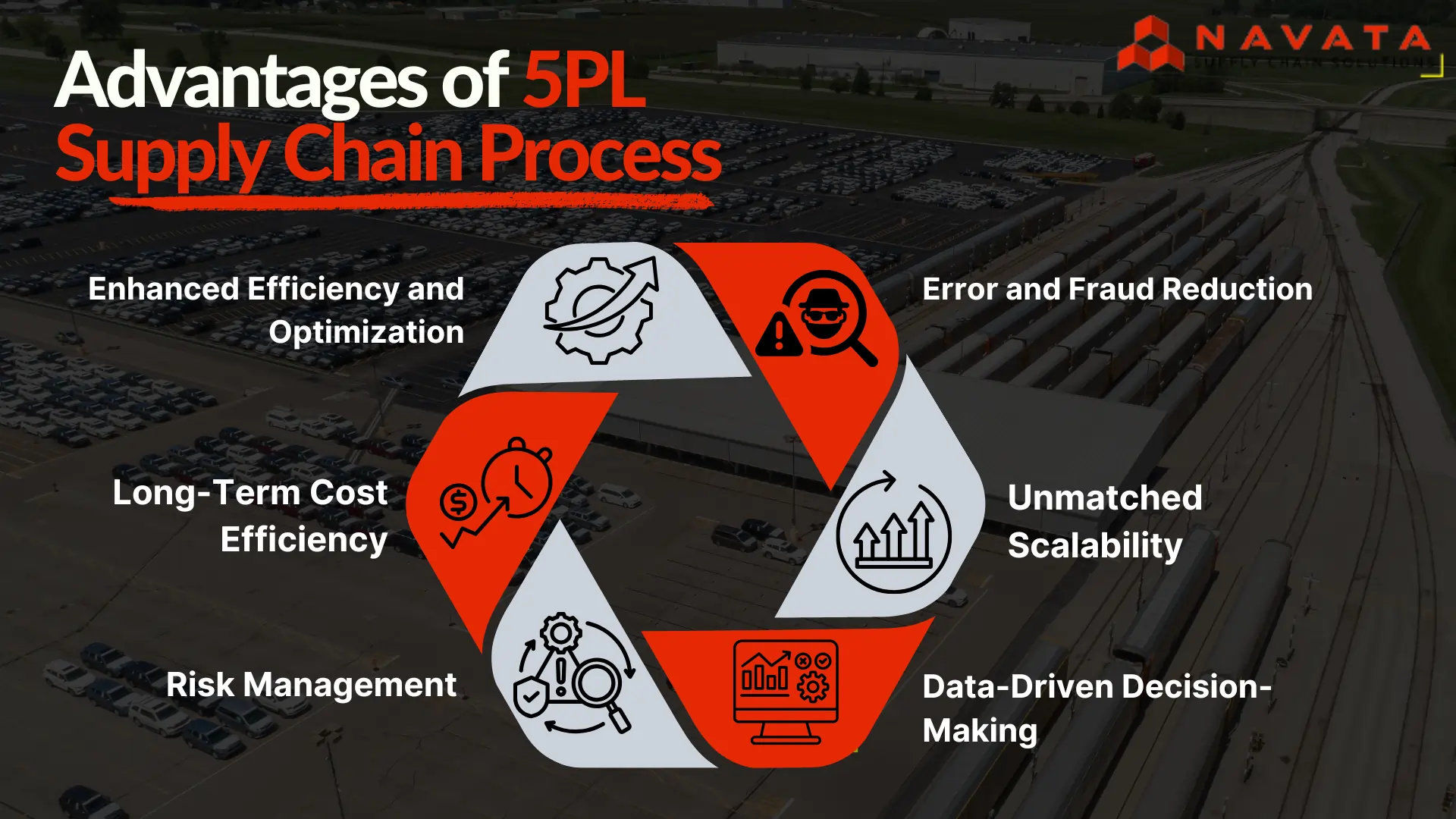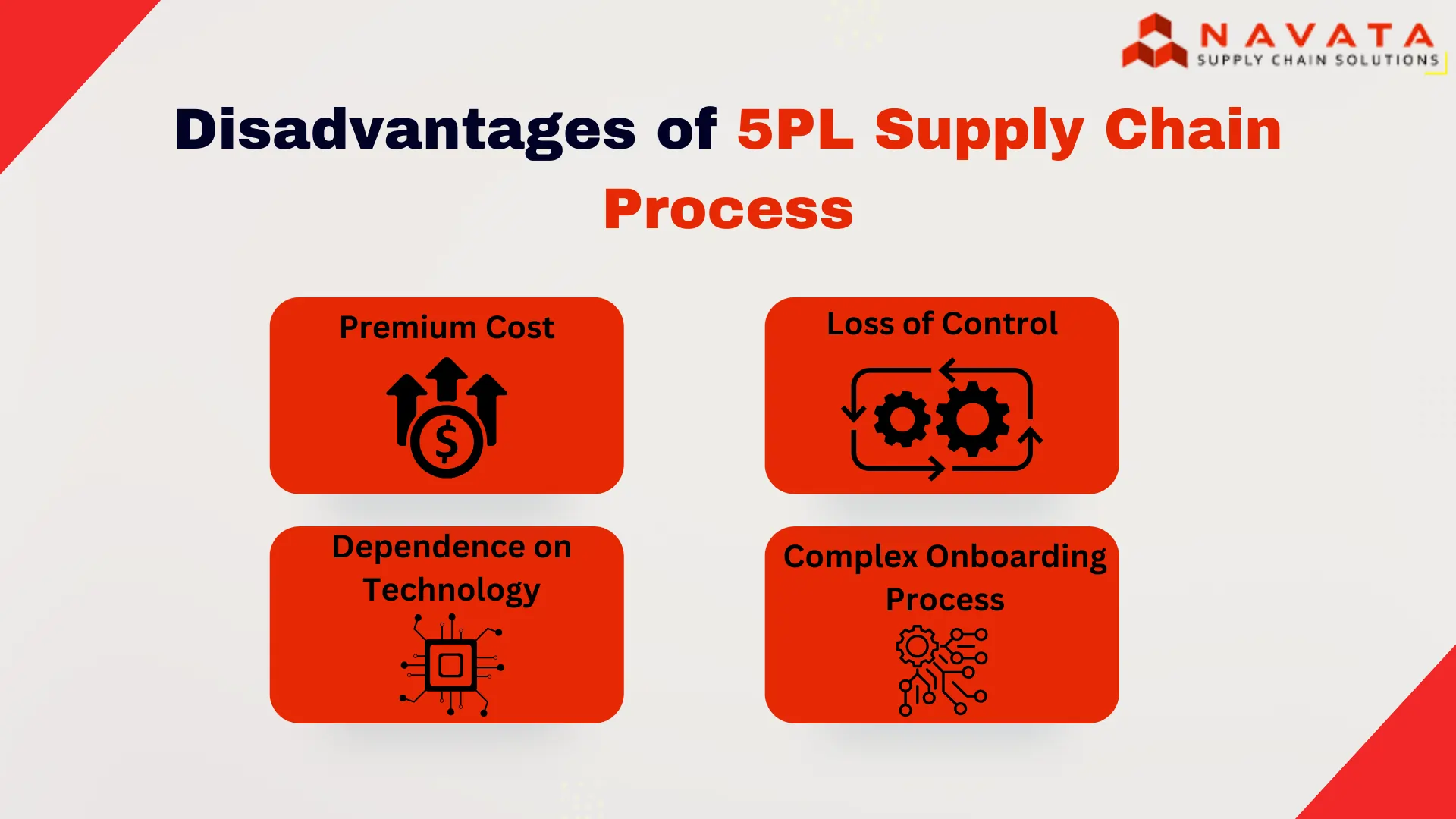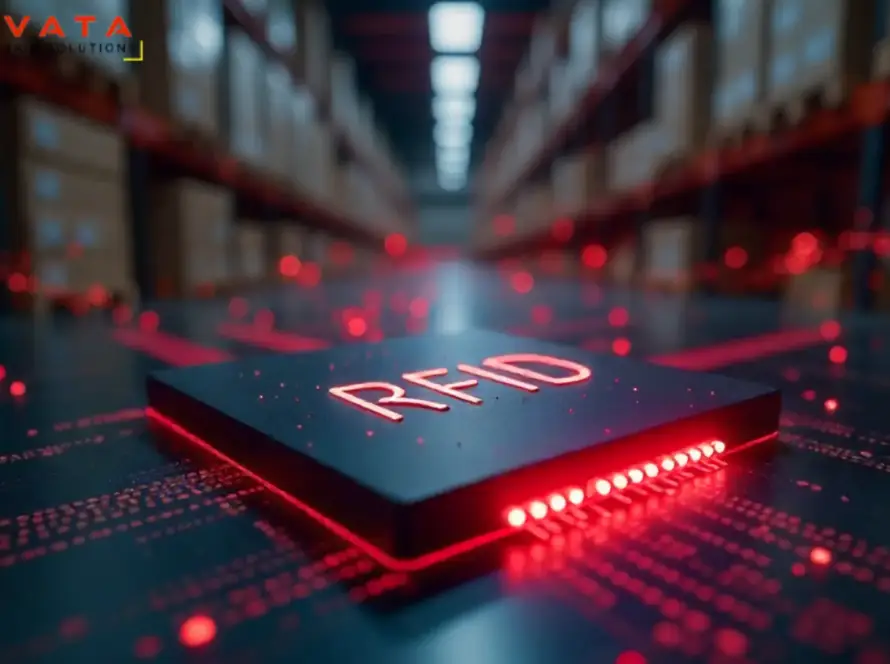What is 5PL?
5PL or Fifth-party logistics refers to a model where a business completely outsources its entire supply chain management to a specialized logistics provider. In this setup, the 5PL company takes full responsibility for designing, organizing, and executing the client’s logistics strategies.
A 5PL provider coordinates and oversees the operations of both third-party (3PL) and fourth-party logistics (4PL) providers, ensuring seamless integration across the supply chain. Additionally, 5PL companies often handle pricing structures and may also renegotiate existing rates to enhance efficiency and cost-effectiveness.
Let’s Dive into What is 5PL? and Learn the advantages, disadvantages, and how fifth-party logistics providers use technology to optimize eCommerce supply chains and global supply chain networks.

You May Also Like to Read: Understanding 3PL 4PL & 5PL
Advantages of 5PL Supply Chain Process
For businesses navigating complex global markets, switching to 5PL logistics can be a truly strategic move. While the comprehensive nature of a 5PL solution might seem overwhelming at first, the benefits of fifth party logistics are compelling
Enhanced Efficiency and Optimization
5PL providers bring unparalleled expertise in supply chain optimization. Their deep understanding of logistics intricacies allows for meticulous planning and route optimization, leading to significant cost savings with 5PL logistics and reduced transportation expenses.
Studies, like one by IntechOpen, even suggest logistics outsourcing can yield savings of over 11%. This end-to-end supply chain integration 5PL means the entire supply chain operates as a single, continuous, and highly efficient system, from procurement to final delivery. This is how 5PL improves supply chain efficiency.
Error and Fraud Reduction
Leveraging AI and automated solutions, 5PL providers can detect and prevent fraudulent activities within the supply chain, including theft, counterfeiting, and unauthorized data access.
Real-time tracking and analytics can flag any deviation from planned routing, alerting management and providing critical logistics data for immediate, informed decisions, reducing logistics risks.
Unmatched Scalability
For businesses looking to expand into international markets, 5PLs offer extensive domestic and international networks, essential for a robust global supply chain. They have established relationships with carriers, customs authorities, and distribution centers worldwide, enabling seamless access to new markets. This demonstrates the scalability benefits of 5PL providers.
A 5PL provider offers crucial flexibility, allowing logistics operations to be adjusted and tailored to fluctuations in demand or rapid business growth. This ensures adaptability without major disruptions, highlighting the strength of 5PL logistics solutions.
Data-Driven Decision-Making
5PL providers utilize machine learning and data-driven technologies to process vast datasets. This capability enables businesses to make timely decisions based on current market trends and demand, leading to optimized inventory levels and reduced carrying costs. This is a key aspect of digital supply chain transformation.
Risk Management
By outsourcing to a 5PL provider, businesses can significantly reduce exposure to disruptions, delays, fines, and other inherent supply chain risks. Real-time tracking and analytics allow for immediate response and proactive resolution of potential issues, providing crucial risk management in fifth-party logistics.
Long-Term Cost Efficiency
While there might be an initial investment, 5PL implementation improves efficiency in the long run. By cutting transportation costs, lowering stock levels, and optimizing supply chain networks, 5PLs contribute to substantial overall cost efficiency for the business. This leads to logistics cost reduction with 5PL.
Neglecting these advantages could mean missing out on significant revenue and scaling opportunities for your company, especially in competitive eCommerce logistics.

You May Also Like to Read: 5 Common 4PL Pain Points and How to Avoid Them
Disadvantages of 5PL Supply Chain Process
While the benefits of 5PL are compelling, it’s crucial to be aware of potential disadvantages of 5PL logistics to determine if a 5PL solution is the right fit for your business:
Premium Cost
- One of the most significant considerations for 5PL solutions is the potential for higher cost of 5PL services compared to traditional logistics setups. The comprehensive nature of 5PL services, spanning from procurement to distribution, often comes at a premium.
- Fees are typically based on the complexity and volume of services, meaning costs can increase as your supply chain operations expand.
Increased Dependency and Loss of Control
- Heavy reliance on a 5PL provider can lead to a reduced level of direct control over specific logistics functions, such as inventory management systems or order processing. Some businesses may find it challenging to relinquish control over these essential elements, leading to a loss of control with 5PL outsourcing.
- Over time, this dependency can create a “vendor lock-in” situation. Transitioning away from a deeply integrated 5PL provider can become complex, time-consuming, and costly.
Dependence on Technology
- As 5PL operations heavily rely on advanced logistics technology and data analytics, they are susceptible to disruptions from cybersecurity events or system failures. Businesses must ensure their 5PL providers have robust security and backup systems in place, addressing potential dependency on 5PL technology risks.
Complex Onboarding Process
- Integrating a 5PL provider into an existing supply chain network can be complicated and time-consuming. Companies must carefully vet potential providers and ensure system and process compatibility to avoid unnecessary expenditures and delays during the transition. This highlights the challenges of implementing 5PL.
- Like any strategic business decision, a thorough assessment of 5PL solutions’ compatibility with your specific business needs and objectives is essential before committing. You must consider when to use 5PL for your business.

You May Also Like to Read: 5 Common Myths About 3PL — Busted for 2025
How Does 5PL Fifth-Party Logistics Work?
Unlike 3PL and 4PL models, 5PL companies specialize in managing end-to-end supply chain operations. The following is a general overview of how 5PL works in supply chain:
Assessment of Supply Chain Needs
The journey begins with a detailed discussion between the exporter/client and the 5PL company to outline specific supply chain requirements. The 5PL provider conducts an in-depth analysis of the client’s current logistics system to identify inefficiencies, regulatory requirements, and opportunities for optimization. This forms the basis of how to choose a 5PL provider.
Tailored 5PL Solution Design
Following the assessment, the 5PL provider formulate a bespoke logistics strategy aligned with the client’s business objectives. It may include optimized transportation routes, warehouse automation, and other additional logistics services.
Technology Integration
5PL services prominently feature the integration of advanced technologies. This includes Artificial Intelligence (AI) tools, Radio Frequency Identification (RFID), blockchain logistics, and other solutions to enhance efficiency and precision. These technologies facilitate real-time tracking, demand forecasting, and route optimization for transparent and effective freight management and logistics management.
End-to-End Logistics Management
Once the system is established, the 5PL provider assumes complete responsibility for the entire supply chain. This encompasses everything from connecting with suppliers and manufacturers, ensuring compliance with international trade standards, organizing and coordinating transportation, and handling last-mile delivery to the customer.
Continuous Monitoring and Optimization
A key differentiator of 5PL is its commitment to ongoing improvement. The 5PL provider consistently analyzes the supply chain through data analytics, continuously identifying opportunities for further optimization. This includes fine-tuning shipping routes, minimizing costs, and ensuring on-time deliveries, even in the face of global supply chain disruptions.
Optimize Your Supply Chain with Experts!
Conclusion
Fifth-party logistics (5PL) represents the pinnacle of supply chain management outsourcing, offering a holistic approach to orchestrate complex supply networks. For eCommerce businesses in particular, the ability of 5PL providers to leverage big data and advanced logistics technology to drive efficiency makes them an incredibly attractive proposition. This model is crucial for global eCommerce logistics solutions.
While the decision to partner with a 5PL provider involves careful consideration of both the premium cost and the shift in control, the potential for enhanced efficiency, scalability, supply chain risk management, and data-driven decision-making is undeniable. For established or fast-growing online retailers seeking an optimized supply chain and a competitive edge in delivering to customers worldwide, embracing 5PL logistics solutions could be the strategic move that ensures your promises are not just made, but consistently kept, leading to better eCommerce fulfillment.
Thanks For Reading: What is 5PL? Your Comprehensive Guide to Fifth-Party Logistics
Powered By 360Presence


1 Comment
Comments are closed.